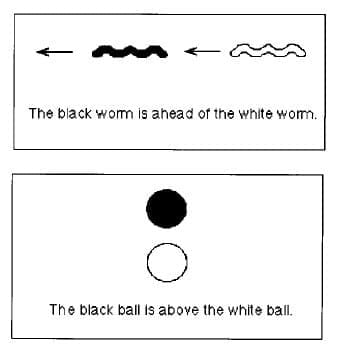In this post
The focus of Boroditsky’s study was in trying to find out if the language that we speak affects how we think when linked to linguistic relativism and linguistic determinism.
English and Mandarin speakers discuss time differently and this study claims that this affects the way in which they think about it. English speakers think in terms of past, present and future, with time moving along in a line (referred to as horizontal thinking), whereas Mandarin speakers talk about time moving up and down in terms of earlier and later respectively (referred to as vertical thinking).
Aim
Does asking Mandarin speakers and English speakers to answer questions about time mean that the way in which they think about it will affect the speed of their response?
Method
- 26 native English speakers and 20 native Mandarin speakers were used as participants. All were students at Stanford University in America
- The concept of ‘priming’ was used which sets someone up to think in a certain way, and the effects of this were then tested

- Horizontal priming was used to set up horizontal thinking, such as seeing one black worm in front of one white worm and vertical priming to set up vertical thinking such as the black ball is above the white ball (shown in the image)
- Participants were shown slides one at a time of scenes with scene statements (like ‘the black ball is above the white ball’)
- For each slide, they were asked if the statement was true or false
- Participants were then shown slides of a ‘time’ statement, such as ‘March comes before April’
- All ‘time’ statements were true, meaning that the priming of thinking horizontally or vertically was being tested
- All questions were asked in English and participants had to answer as quickly as possible
- It was thought that if Mandarin speakers were still faster when working in English and when vertically primed that language does in fact guide thinking
- 16 target statements about time and 16 filler statements were used altogether
Conclusions
It was concluded that English and Mandarin speakers do think differently about time. English speakers were able to answer statements faster when horizontally primed than when vertically primed, showing that English speakers use a horizontal view of time.
Native Mandarin speakers were only able to answer questions faster about time when vertically primed and when the questions used more time-related working. This also suggests that language affects thought because Mandarin speakers have a vertical view of time. This was true for Mandarin speakers even when tested in English, showing again that thought is affected by a native language, even when speaking in a different one.
Strengths of the study
- A strength is that as this was a laboratory study, variables were controlled very well, meaning that results are reliable
- The researchers carried out two more similar experiments after this one and findings were similar, giving further reliability to the study overall.
Weaknesses of the study
- A weakness is that the study is reductionist as only the concept of time was explored. This might mean that other concepts are not affected by language
- Finally, the fact that such a small sample was used and that the participants were all university students means that it is difficult to generalise the findings to a wider population.



